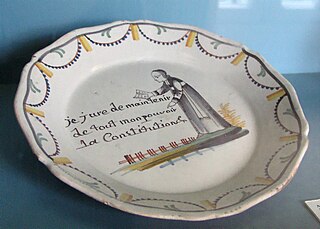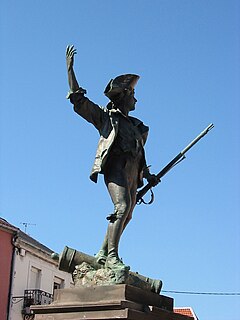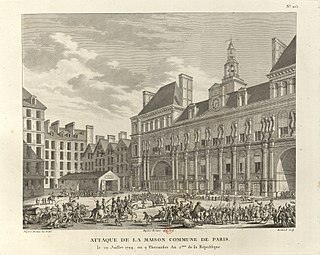 W
WThe Civil Constitution of the Clergy was a law passed on 12 July 1790 during the French Revolution, that caused the immediate subordination of the Catholic Church in France to the French government.
 W
WThe term "fédérés" most commonly refers to the troops who volunteered for the French National Guard in the summer of 1792 during the French Revolution. The fédérés of 1792 effected a transformation of the Guard from a constitutional monarchist force into a republican revolutionary force.
 W
WThe Fête de la Fédération was a massive holiday festival held throughout France in 1790 in honour of the French Revolution. It is the precursor of the Bastille Day which is celebrated every year in France on 14 July, celebrating the Revolution itself, as well as National Unity.
 W
WThe Nancy affair, commonly referred to in English as the Nancy Mutiny, was the crushing of a military mutiny in France on 31 August 1790, two years before the final overthrow of the French monarchy. The mutiny was of particular significance in that it illustrated the degree to which the discipline and reliability of the Royal Army had been undermined by thirteen months of revolutionary turmoil.
 W
WThe National Constituent Assembly was a constituent assembly formed from the National Assembly on 9 July 1789 during the first stages of the French Revolution. It dissolved on 30 September 1791 and was succeeded by the Legislative Assembly.
 W
WThe Paris Commune during the French Revolution was the government of Paris from 1789 until 1795. Established in the Hôtel de Ville just after the storming of the Bastille, it consisted of 144 delegates elected by the 60 divisions of the city. Before its formal establishment, there had been much popular discontent on the streets of Paris over who represented the true Commune, and who had the right to rule the Parisian people. The first mayor was Jean Sylvain Bailly, a relatively moderate Feuillant who supported constitutional monarchy. He was succeeded in November 1791 by Pétion de Villeneuve after Bailly's unpopular use of the National Guard to disperse a riotous assembly in the Champ de Mars.
 W
WReflections on the Revolution in France is a political pamphlet written by the Irish statesman Edmund Burke and published in November 1790. It is fundamentally a contrast of the French Revolution to that time with the unwritten British Constitution and, to a significant degree, an argument with British supporters and interpreters of the events in France. One of the best-known intellectual attacks against the French Revolution, Reflections is a defining tract of modern conservatism as well as an important contribution to international theory. The Norton Anthology of English Literature describes Reflections as becoming the "most eloquent statement of British conservatism favoring monarchy, aristocracy, property, hereditary succession, and the wisdom of the ages." Above all else, it has been one of the defining efforts of Edmund Burke's transformation of "traditionalism into a self-conscious and fully conceived political philosophy of conservatism".
 W
WThe Revolution Controversy was a British debate over the French Revolution from 1789 to 1795. A pamphlet war began in earnest after the publication of Edmund Burke's Reflections on the Revolution in France (1790), which surprisingly supported the French aristocracy. Because he had supported the American colonists in their rebellion against Great Britain, his views sent a shockwave through the country. Many writers responded to defend the French Revolution, such as Thomas Paine, Mary Wollstonecraft and William Godwin. Alfred Cobban calls the debate that erupted "perhaps the last real discussion of the fundamentals of politics" in Britain. The themes articulated by those responding to Burke would become a central feature of the radical working-class movement in Britain in the 19th century and of Romanticism. Most Britons celebrated the storming of the Bastille in 1789 and believed that Kingdom of France should be curtailed by a more democratic form of government. However, by December 1795, after the Reign of Terror and the War of the First Coalition, few still supported the French cause.
 W
WThe revolutionary sections of Paris were subdivisions of Paris during the French Revolution. They first arose in 1790 and were suppressed in 1795.
 W
WThe Society of the Friends of the Blacks was a French abolitionist society founded during the late 18th century. The society's aim was to abolish both the institution of slavery in the France's overseas colonies and French involvement in the Atlantic slave trade. The society was founded in Paris in 1788, and remained active until 1793, during the midst of the French Revolution. It was led by Jacques Pierre Brissot, who frequently received advice from British abolitionist Thomas Clarkson, who led the abolitionist movement in Great Britain. At the beginning of 1789, the Society had 141 members.
 W
WA Vindication of the Rights of Men, in a Letter to the Right Honourable Edmund Burke; Occasioned by His Reflections on the Revolution in France (1790) is a political pamphlet, written by the 18th-century British liberal feminist Mary Wollstonecraft, which attacks aristocracy and advocates republicanism. Wollstonecraft's was the first response in a pamphlet war sparked by the publication of Edmund Burke's Reflections on the Revolution in France (1790), a defense of constitutional monarchy, aristocracy, and the Church of England.